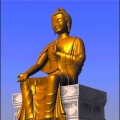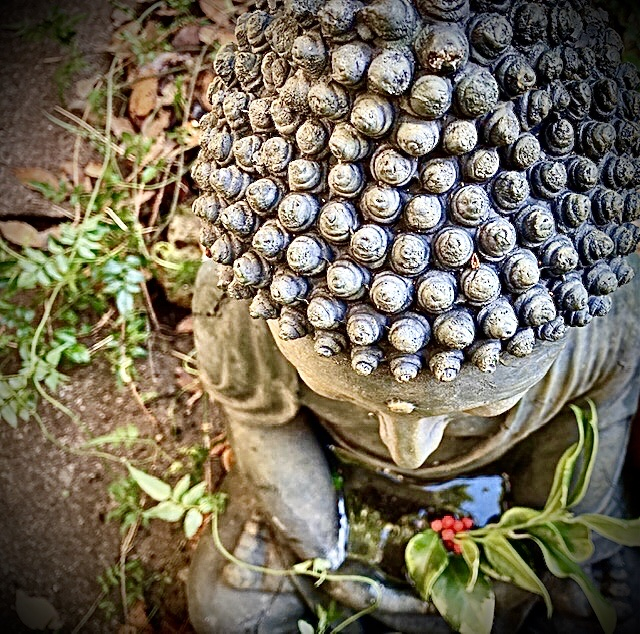Welcome home! Please contact lincoln@icrontic.com if you have any difficulty logging in or using the site. New registrations must be manually approved which may take several days. Can't log in? Try clearing your browser's cookies.
Pure Land
 opiumpoetry
Delaware, Ohio, USA Explorer
opiumpoetry
Delaware, Ohio, USA Explorer
For anyone who is inclined to dismiss Pure Land as a lazy short-cut to Bodhi, perhaps this website will put things into perspective: https://tricycle.org/beginners/buddhism/who-is-amida-buddha/
4





Comments
Hello there. I started a thread on pure land Buddhism some time ago.
https://newbuddhist.com/discussion/26641/pure-land-buddhism/p1
A discussion on Pure Land for those new to the practice.
Amituofo 🙏❤️
From the video above:
“The Buddha taught us many ways in his decades of teaching to practice the Buddhadharma.
Mapped out in 80,000 discourses and Sutras.
Some of these are learning practices, such as Sutra recitations.
Others are vastly intricate and beautiful such as Vajrayana visualisation Sadhanas.
Yet, for most of us, the sublimely simple practices, are the best way to approach the Dharma.
From Mindfulness practice, to the most misunderstood of practices, chanting Amituofo.”
Ah ha … suits me
Namo Amitabha
https://buddhismnow.com/2017/08/04/wu-wei-you-cant-do-it-wrong-by-john-aske/
@bunks Hope you are well ? I’m recently dipping my toes more deeply in Pure Land (Japanese) and I have to say that I’m rather enjoying the warmth and simplicity of the practice (accepting that there is additional underlying depth should one pursue it). I’ve reconciled myself to the fact that I’m just not going to be poring over reams of sutras in Pali or Sanskrit and immersion in a simpler and more homely practice suits me better.
Nice one Alex. I hope you find peace and comfort mate. Japanese Pure Land is a more simple practice than it’s Chinese counterpart that tends to mix other practices in with simple Nianfo (Nambetsu). I think the Japanese focus more just on the 18th vow while the Chinese look at the 19th vow. See which suits you.
@Bunks Thanks mate 🙏🏻Are you still practicing with a group ? I seem to remember you sending me a zoom link somewhere back there
No, not anymore. I left. What do they call it? “Creative differences”?
@bunks Ah, like the Beatles ! Are you practising a particular strand of Buddhism, or carving your own path ?
I mix Theravadan and Pure Land. Chalk and cheese but they taste nice
Some forms of Buddhism are more like spiritual comfort food. I hope it proves beneficial to you, @Alex
Some observations have secret thorns. I hope it proves beneficial to the observer.
I was on another forum and one of the regulars was a purelander. And … she had entered the Pure Land in this very life, in this very realm.
How? By visiting Pureland temples, practicing. Immersing herself and sharing the visits with photos …
https://www.buddhistdoor.net/features/cleaning-our-minds-and-seeing-the-pure-land/
Nice.....there are many Pure Lands.......
Yes indeedy. My garden is a pureland. Here is the Buddha holding the last of the Holly and the Ivy …

Spring bulbs are shooting skyward. Jasmine all over is in bud. A nasturtium is still flowering. Snowdrops about to flower. My 'Advent Star', Winter Rose has five buds ready to flower. Hell has frozen over. It is winter. It is a Pureland …
How to practice when my life is so busy?
Exactly. ). As mostly Westerners, we have a tendency to overcomplicate, think ourselves silly/impeded and generally waste our time.
). As mostly Westerners, we have a tendency to overcomplicate, think ourselves silly/impeded and generally waste our time.
Simplicity and Great Faith and instant absence of noodling (yum … oops … just like noodles with stir fry
Repetition of a simple formula works very well for some.
I have my own Pureland it is reserved for:
Highlanders and Lowlanders, Buddhas and demons, fish fry and ex-bodhi. Mystics from all religions or nun. Nones and Monks. Animals and trees. Dimensions undiscovered.
OM YA HA HUM
https://yinyana.tumblr.com/post/57234975984/buddhist-mantra-faqs
New book: Let’s go to Amitabha’s Pure Land. Free PDF below.
https://drive.google.com/file/d/1Ik27zE0IPveBlQFUOsYVSQXD7RE-RWhq/view?fbclid=IwAR3NhuuG-_YALdQo6YtZUEvPcdWHbGeRbb8QPZsnvaA3MxiDqj1AS-iD4AU
Do you have multiple mantras for different states of being?
Is a pet-name a type of relationship mantra?
You know, thats an interesting question. I would say a pet name calls the animal to mind, and so also what it means to you. So probably yes, but it isn’t a proper mantra in that it was not given with a certain empowerment in mind.
The Way to be Reborn in the Pure Land
Yes. Sure.
The Being is drawn into the associated mantra. So for example, just finished a 'Medicine Buddha' practice.
https://www.lamayeshe.com/article/advice-benefiting-animals
So faith, vows and practice. For me, faith and vows fade from the mind unless they are periodically renewed. So while i can (and have done) the practice, i doubt whether i fulfill their requirements.
Yes, the three supposedly strengthen each other.
Are the teachings of Pure Land Buddhism at odds with Theravadan Buddhism?
They say Mahayana teachings include Theravada buddhism, but how true is that? I don’t see Mahayanists being trained to the same extent in self-reliance, etc. Perhaps one would have to spend time in a Theravada culture and in a Mahayana culture in order to find out.
A couple of recent purchases made.
A Seed in Amitabha's Hands is an excellent book written by a Spanish Layman about his journey on the path and also covers Mahayana Buddhism in general.
The Land of Pure Bliss is more of an academic book explaining the history of Pure Land Buddhism and the Masters who have practiced and passed it down through the years. It also has a full translation of the Pure Land Sutras.
Both good reads for different reasons.
Enlightenment of the Cosmic Buddhas
https://t.co/oreMF1qz7C
A reminder that there is a 24 hour Nianfo zoom channel available.
Also, a one week retreat will be held each month. All details below.
Namo Amituofo 🙏🏻❤️
Pureland Practitioners are no longer of this saha world, they are people of another realm, by Master Jingzong
Individual people and the world resemble a tightly sealed boiler. Humankind’s afflictions of greed and anger are like the fire, while the constraints imposed by worldly laws and ethics are the walls of the boiler. People are like the water in the container.
The rapid development of technology today has facilitated the extensive expression of human creativity. At the same time the pursuit of material desires has greatly intensified, and conflicts and crises have multiplied. The constraints of conscience are weakening and moral values are falling by the wayside. This is like the fire burning ever more fiercely inside the boiler, even as the container’s walls are being corroded. The water boils and the pressure from the steam builds steadily; the boiler is in danger of exploding any time.
The reality is that more and more people, unable to bear the intense pressure, are taking their own lives. Indeed, the whole world is like a powder keg that could ignite at any minute!
Thinking people are all worried about the situation. These problems would naturally be solved if practitioners could douse the flames of greed and anger, and achieve a realization of emptiness. In that case, the fire would be extinguished, the water cooled – and the pressure would vanish. Yet ordinary beings today are incapable of accomplishing this. So while this is a door to a solution, it is a door that is closed.
Buddhism’s Pure Land school teaches us to cultivate an aversion towards our Saha world and a joyful aspiration to the Land of Bliss. It is like removing the fire underneath and opening the boiler’s top. Though the flames of greed and anger have not been put out and the water of wisdom have yet to form, the pressure is quickly released. We feel at peace, relieved and happy.
Today’s Pure Land practitioners have not extinguished their inner flames of greed and anger. But they understand deeply the suffering and unease that such afflictions bring to themselves and others, to the nation and to the world. With their basic attitude of aversion and letting go, they no longer wish to experience intense conflict with either themselves, other people or the world as a result of personal pursuits. Such actions would only worsen the suffering all around.
At a fundamental level, Pure Land practitioners have no expectations of this world. They chase after nothing, and have neither powerful loves nor hatreds. They are not judgmentally attached to notions of good and evil. They have let go, and their minds are unfettered and calm. They view themselves, others and the world with a sense of peaceful harmony. A Pure Land practitioner thinks, “What can I really do for others?”
The minds of Pure Land practitioners are settled and at ease, focused on the Land of Bliss a hundred thousand koti Buddha-lands away. There, their minds find repose and comfort, and are energized. Their eyes too are focused there. They are no longer of this world, and they have no desire to possess a single tree or blade of grass here. They are people of another realm.
(Pure Land Perspectives on ‘Humanist Buddhism’, By Dharma Master Jingzong, English translation by Householder Jingtu, pages 19-20)
🙏 Namo Amitabha Buddha 🙏
Dr. Andrew M Henry (a scholar of religious studies) speaks about the history of Pureland Buddhism.
Namo Amitabha Buddha
Have started a YouTube channel dedicated to the Pure Land path. Nothing special. Just a few short audio clips. Will update and post new talks as I complete them.
Namo Amituofo 🙏🏻❤️
@Bunks Those are quite good, please do. I especially liked your Talk to Householders. 🙏🏻
Thank you 🙏
5 minute Nianfo with wooden fish
We are now living in the Dharma Ending Age…..Amitabha Buddha is our only salvation 🙏🏻❤️📿
It’s interesting, one of the tricks guru’s would use (according to Joel Kramer’s The Guru Papers) was to call out an apocalypse which would take place sometime in the future, from which their way was the only salvation. This would then bind the followers closer together and draw in others who were seeking salvation… it seems to be a long-established pattern which gets followers to publicise their faith more.
Very interesting book, The Guru Papers.
The Hindrance of Doubt
I can imagine my family bouncing shoes and other heavy objects off my head if I meditated with a chant.
They're my greatest teachers of patience and tolerance though.
Can you chant it inside your head?
… there I was in the Pureland of Jhambala … when I realised I had taken a wrong turning …
https://buddhism.redzambala.com/buddhism/buddha-aspects/who-is-red-zambala-in-buddhism.html
Definitely! That’s how I do it most of the time 🙏🏻
For some reason this seems like the sound of the universe to me.
Namo Amida Bu 🙏🏻❤️📿
@Tosh - I’d suggest you mouth the words as you chant though. If that’s not possible you can try mouthing them with your lips closed (if that makes sense).
This allows greater focus on the words.
“If, when I attain Buddhahood, sentient beings in the lands of the ten quarters who sincerely and joyfully entrust themselves to me, desire to be born in my (Pure) land, and call my Name, even ten times, should not be born there, may I not attain perfect Enlightenment.”
Amitabha Buddha’s Primal Vow
"Suppose that a man whom one deeply trusts and of whom one has no cause for suspicion whatsoever, tells you about a place he knows first hand, saying that there is a mountain here, a river there. You believe deeply what he says, and after you have accepted these words, you meet other people who say it is all false. There is no mountain or no river.
Nevertheless, since what you have heard was said by a person whom you cannot think would speak a mere fabrication, a hundred thousand people might tell you differently but you would not accept it. Rather, you deeply trust what you heard first. This is called trust. Now, believing in what Shakyamuni taught, entrusting yourself to Amitabha's (Primal) Vow, and being without any doubt should be like this."
… and that is why I still believe in Father Christmas. I trusted my parents …
… oh wait I am no longer a child … [oops]
… then there was the time I wrote my own obituary, after someone I trusted informed everyone I had died …
Trussed and roasted
I think you trust like that when you have been a child and your trust has never been broken. People around you have spoken the truth and your natural trust is still the same.
But for most people, they learn that people lie, as they get older their trust fades, they require more proof.